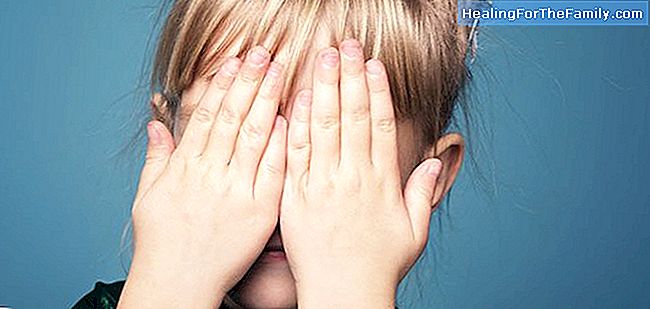Decalogue of the fears of children
The fear of children is of evolutionary character. As children age, they go through different stages and experience different childhood fears, which change as they get better. Within this evolution, children must overcome some fears to bravely face the following. The problem of the fears of the chil
The fear of children is of evolutionary character. As children age, they go through different stages and experience different childhood fears, which change as they get better. Within this evolution, children must overcome some fears to bravely face the following. The problem of the fears of the children appears when these fears do not evolve, they become encystical and do not disappear from one stage to another of the growth.
Overcoming every fear is important. Generally, this is something that happens naturally, but sometimes, it is not so easy for some children because they can be linked to unpleasant experiences, for example. Parents should be the first to realize this circumstance and help their children overcome their fears.
How to help overcome the fears of children?

1. Fear of strangers
a) It is the first fear that manifests itself in the baby around nine months. At this age, she begins to miss her reference adults when they are not around and she does not want to leave the arms of her father and mother to stay with another person, who although she has seen her before, probably does not remember her.
b) Talking to strangers is a risk, that children should learn, but avoiding that they increase their fears, always transmitting confidence and security. Teach him to be cautious and not to accept objects, candies or invitations from strangers.
Positive education: Respect the child's fear and do not belittle him / her for being afraid, telling him / her that he / she is a fearful person ... Praise his advances even if they are minimal and that way you will help him to be a little braver each day. To prevent your baby from expressing a strong fear of separation from his parents, from six months he encourages contact with relatives and other people, so that when the time comes he will be familiar with other people.
2. Fear of separation
Generally, it focuses on the figure of the mother and takes place at the beginning of the nursery or school or due to a divorce. This fear arises when the child suffers when separated from the people to whom he is affectionately united, above all, from his mother.
With the truth ahead. Inform the child naturally about what is happening, it will help him a lot to overcome his fear. It is better for him to talk openly about dad or mom coming over the weekend to play with him or pick him up after school, with a clear and simple language, that he can understand, that lie or disguise the reality, that in Sometimes you can feed your fears more than transmit calmness.
3. Fear of changes
Habits and routines provide security for children and babies and, therefore, a change of house, school, culture, country, friends ... can become a nightmare for the child . To avoid that the changes produce fear in the child, we must anticipate and tell him what will happen, in this way, the child can prepare psychologically for the new situation. It is important that you talk about the new change with optimism and hope towards a better situation.
Prepare him for what will come.In order to avoid that the changes produce fear in the child, we must anticipate and tell him what is going to happen, in this way, the child will be able to prepare himself psychologically for the new situation. It is important that you talk about the new change with optimism and hope towards a better situation.
4. Fear of the dark
Prevents the child from suffering negative and sudden experiences, and places a small light on or a bright light in his bedroom so he can see and his room is never completely dark. One in three children fears darkness.
Avoid negative and sudden experiences. Keep in mind that this fear of the dark can arise from a bad explanation of tales of monsters, or from nightmares and imaginary situations. For this reason, he selects films and children's programs appropriate to his age and chooses appropriate readings.
5. Fear of thunder and storms
Storms and the noise of thunder that, in many fiction scenes, are associated with stories of fear can make children grow afraid of these natural phenomena.
Avoid overprotecting your child.To accustom the child to thunder and storms, bring him to the window as soon as it rains so that he sees thunder and lightning as something natural and normal related to bad weather. Explain that it is a temporary natural phenomenon that will not harm you. Learning to face problems from a young age, will turn you into an independent person with your own resources to deal with complications.
6. Fear of animals
Life in cities makes contact with animals less frequent, so it is normal for animals, as strangers, to cause fear in children.
Keep calm in situations of stress. Avoid transmitting fear to your child or seeing you stressed or afraid in the presence of an animal. It is convenient to familiarize children with animals since they are small. Teaching them to respect and take care of them is fundamental to ward off their fear. Do not obsteet and always naturally you should warn the child of the danger that can occur if he approaches an unknown animal. In this case, it is always convenient to keep the distance.
7. School fears
There are many fears that revolve around the school. In younger children anticipatory anxiety or fear is common in the moments before arriving at school and in older children there are others such as fear of school failure and punishment, social fear of activities that must be performed in public how to read, expose a job ... and the fear of physical discomfort.
Encourages problem solving on the part of the child. Because children spend most of their time at school helping them build a solid self-esteem, providing them with self-confidence, it is the best thing that parents can do. Avoid always resorting to you to get a solution, because you will be preventing them from developing their autonomy and independence.
8. Nighttime fears
Most nighttime fears are related to other fears such as fear of darkness, loneliness, separation, dreams and nightmares ... When the problem lies in the difficulty of the child to falling asleep, it is only convenient to find the real cause of your fear to dismantle it little by little.
Subtract importance from your child's fears and fears.Sometimes, it is convenient to de-dramatize to dismantle the child's fear. It is convenient to remind the child that their fears are normal and that they are part of their development.
9. Fear of physical damage
Jumping off a trampoline, going too fast on the bicycle ... can pose a risk to the physical integrity of children. Some may even stop doing some sports activities for fear of damage and pain due to personal fouls or entry into the field.
Strengthens the courage of the child.Encourage her to do the sport or the physical activity she likes, so that she will gradually face situations that cause her fear. Highlight their courageous behavior.
10. Fear of death
A negative experience about the loss of a loved one can trigger the fear of death in the child, not knowing what awaits us beyond life.
Conceal your fears. Many people prefer not to think about this topic, but remember that children learn by imitation and your child could develop phobias just because you have them.
Marisol Nuevo.












